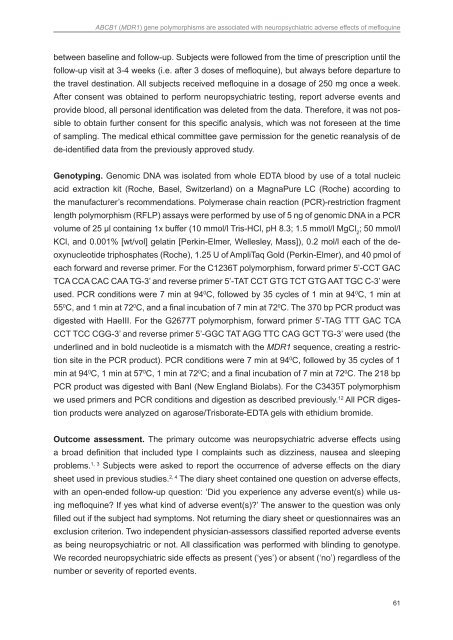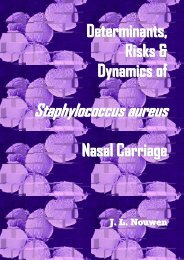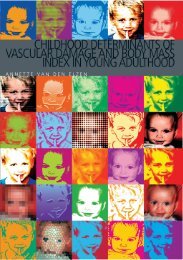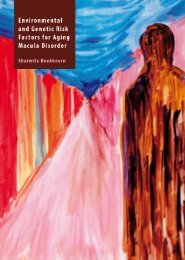Genetic susceptibility to adverse drug effects - Epidemiology ...
Genetic susceptibility to adverse drug effects - Epidemiology ...
Genetic susceptibility to adverse drug effects - Epidemiology ...
Create successful ePaper yourself
Turn your PDF publications into a flip-book with our unique Google optimized e-Paper software.
ABCB1 (MDR1) gene polymorphisms are associated with neuropsychiatric <strong>adverse</strong> <strong>effects</strong> of mefloquine<br />
between baseline and follow-up. Subjects were followed from the time of prescription until the<br />
follow-up visit at 3-4 weeks (i.e. after 3 doses of mefloquine), but always before departure <strong>to</strong><br />
the travel destination. All subjects received mefloquine in a dosage of 250 mg once a week.<br />
After consent was obtained <strong>to</strong> perform neuropsychiatric testing, report <strong>adverse</strong> events and<br />
provide blood, all personal identification was deleted from the data. Therefore, it was not possible<br />
<strong>to</strong> obtain further consent for this specific analysis, which was not foreseen at the time<br />
of sampling. The medical ethical committee gave permission for the genetic reanalysis of de<br />
de-identified data from the previously approved study.<br />
Genotyping. Genomic DNA was isolated from whole EDTA blood by use of a <strong>to</strong>tal nucleic<br />
acid extraction kit (Roche, Basel, Switzerland) on a MagnaPure LC (Roche) according <strong>to</strong><br />
the manufacturer’s recommendations. Polymerase chain reaction (PCR)-restriction fragment<br />
length polymorphism (RFLP) assays were performed by use of 5 ng of genomic DNA in a PCR<br />
volume of 25 µl containing 1x buffer (10 mmol/l Tris-HCl, pH 8.3; 1.5 mmol/l MgCl 2<br />
; 50 mmol/l<br />
KCl, and 0.001% [wt/vol] gelatin [Perkin-Elmer, Wellesley, Mass]), 0.2 mol/l each of the deoxynucleotide<br />
triphosphates (Roche), 1.25 U of AmpliTaq Gold (Perkin-Elmer), and 40 pmol of<br />
each forward and reverse primer. For the C1236T polymorphism, forward primer 5’-CCT GAC<br />
TCA CCA CAC CAA TG-3’ and reverse primer 5’-TAT CCT GTG TCT GTG AAT TGC C-3’ were<br />
used. PCR conditions were 7 min at 94 0 C, followed by 35 cycles of 1 min at 94 0 C, 1 min at<br />
55 0 C, and 1 min at 72 0 C, and a final incubation of 7 min at 72 0 C. The 370 bp PCR product was<br />
digested with HaeIII. For the G2677T polymorphism, forward primer 5’-TAG TTT GAC TCA<br />
CCT TCC CGG-3’ and reverse primer 5’-GGC TAT AGG TTC CAG GCT TG-3’ were used (the<br />
underlined and in bold nucleotide is a mismatch with the MDR1 sequence, creating a restriction<br />
site in the PCR product). PCR conditions were 7 min at 94 0 C, followed by 35 cycles of 1<br />
min at 94 0 C, 1 min at 57 0 C, 1 min at 72 0 C; and a final incubation of 7 min at 72 0 C. The 218 bp<br />
PCR product was digested with BanI (New England Biolabs). For the C3435T polymorphism<br />
we used primers and PCR conditions and digestion as described previously. 12 All PCR digestion<br />
products were analyzed on agarose/Trisborate-EDTA gels with ethidium bromide.<br />
Outcome assessment. The primary outcome was neuropsychiatric <strong>adverse</strong> <strong>effects</strong> using<br />
a broad definition that included type I complaints such as dizziness, nausea and sleeping<br />
problems. 1, 3 Subjects were asked <strong>to</strong> report the occurrence of <strong>adverse</strong> <strong>effects</strong> on the diary<br />
sheet used in previous studies. 2, 4 The diary sheet contained one question on <strong>adverse</strong> <strong>effects</strong>,<br />
with an open-ended follow-up question: ‘Did you experience any <strong>adverse</strong> event(s) while using<br />
mefloquine? If yes what kind of <strong>adverse</strong> event(s)?’ The answer <strong>to</strong> the question was only<br />
filled out if the subject had symp<strong>to</strong>ms. Not returning the diary sheet or questionnaires was an<br />
exclusion criterion. Two independent physician-assessors classified reported <strong>adverse</strong> events<br />
as being neuropsychiatric or not. All classification was performed with blinding <strong>to</strong> genotype.<br />
We recorded neuropsychiatric side <strong>effects</strong> as present (‘yes’) or absent (‘no’) regardless of the<br />
number or severity of reported events.<br />
61









